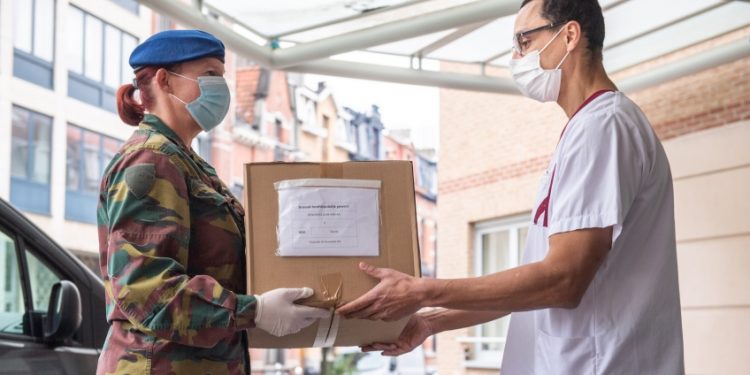Armed Forces Personnel at the Frontline!
One of the essential elements of the training of soldiers is the preparation to be sent to a crisis area or, in the most extreme case of war, to the frontline. As you may have already understood, I do not want to talk about this kind of frontline today.
Since the outbreak of the COVID-19 crisis and its official recognition as a pandemic by the WHO, military personnel have been deployed to support societies in almost all European countries. From specialised military medical personnel to logistics and security personnel, soldiers were deployed to deal with this pandemic. And let us repeat here once again that we find this acceptable in these exceptional circumstances. Allow me to quote the Belgian Chief of Defence, Gen Marc Compernol, in a recent farewell interview in view of his retirement on 10 July 2020. Asked about his opinion if this kind of tasks is something the military should do, he answered (Het Nieuwsblad, Saturday 27 June 2020, Page 10): “If you are able to do that, it would be almost criminal not to do it. But we are not supposed to become the government’s transportation company from now on. Defence could take on more domestic tasks, but this would require proper agreements and extra resources.”
In addition, sufficient resources of various kinds must be permanently available. And let it be clear that the availability of strategic stocks does not only or always has to be focused on defence or be a sole responsibility of the armed forces.
Let us briefly return to the personnel deployed. We underline once again that the list of tasks performed by soldiers all over Europe is huge. Who would have expected that, in addition to security or control missions, soldiers would also be deployed in industrial activities to make personal and collective protective equipment or even to be deployed in retirement homes to support older and needy fellow citizens. In the context of different kinds of assistance during the pandemic, the description “frontline workers” was soon used to describe members of staff and volunteers of all kinds. Although we do not think there is a detailed framework within which frontline workers belong or work, it is not superfluous to look at whether there is a definition of the term used and if so, which one?
Based on what we read and see in the traditional and social media, as well as in various documents and positions from organisations and institutions, health and social care workers, but also to mail and parcel distributors, bus and train drivers, transport, warehouses staff, food supplies and critical infrastructure and others are often described as “frontline workers”. But rarely, if ever, are the soldiers on these lists! However, we do not want and need to have a semantic discussion about this. And upon inquiry, our suspicion was confirmed, that there is no definition for frontline workers.
However, the International Labour Organisation (ILO) does have a definition of essential services. “An essential service is one which, if interrupted, would risk the health, safety or life of all or part of the population”. Article 3 of Convention No. 87 establishes the right of workers’ organisations to organise their administration and activities and to formulate their programmes without interference by the public authorities. As we all know, several countries do limit rights flowing from Article 3 to groups of workers that are considered essential services. Allow me to remind you that the ILO Convention No. 87 stipulates that “the extent to which the guarantees provided for in this Convention shall apply to the armed forces and the police shall be determined by national laws or regulations”. Therefore, governments are even not obliged to consider if armed forces are essential services or not. But does this mean that the door is closed? Absolutely not! The Committee of Experts of the ILO has clearly said that members of the armed forces are considered as such only when they are engaged in military duties! So at that point there is room for manoeuvre!
The conclusion is that there is no clear definition of frontline workers but nevertheless references to a description of this type of activity are made in various articles and studies. It is thus currently unclear whether military personnel deployed in the response to the COVID-19 pandemic are meant or not. A debate is possible via various links to definitions, conventions or guidelines. However, would it be so illogical that, given the special situation that will not be over in the short term, a clear and binding definition of frontline workers is drawn up?
And today this may not be of tremendous importance since it is about sensitivities and recognition, which are justified by the way. But why wait until the term frontline workers is used in legislative or regulatory texts with a number of statutory or financial consequences associated with this?
Due to this pandemic, the social partners and the ILO at the highest level have the ideal framework available to open this debate on short term. Let’s not waste time and act resolutely soon!
Emmanuel Jacob, President EUROMIL

